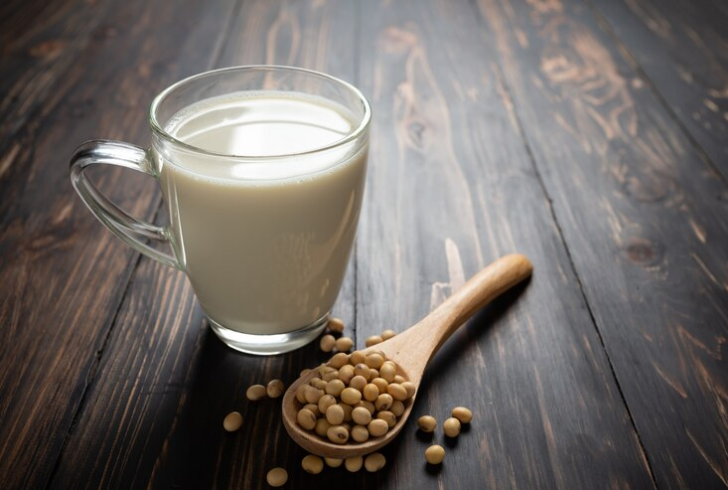
What Is the Best Milk for Gut Health and Why?

In recent years, the milk section at the grocery store has expanded far beyond the traditional options. While cow’s milk has been a dietary staple for centuries, today’s consumers have a plethora of alternatives to choose from, each boasting unique benefits and nutritional profiles. With so many choices available, you might find yourself asking, what is the best milk for gut health?
Let’s explore the best milk for gut health and their benefits, particularly for those with dietary restrictions or specific health conditions.
Exploring Reasons to Ditch Cow’s Milk

Freepik | KamranAydinov | Lactose intolerance can cause bloating, cramps, diarrhea, or gas after consuming dairy.
Some people choose to steer clear of cow’s milk for various reasons. Let’s explore a few common ones:
- Dairy Allergy: This immune system response can trigger an itchy rash or eczema after consuming milk.
- Lactose Intolerance: This inability to fully digest lactose, a sugar found in milk, can lead to bloating, cramps, and unwelcome digestive woes.
- Celiac Disease or Irritable Bowel Syndrome (IBS): Individuals with these conditions require meticulous dietary management, often eliminating dairy products entirely.
- Chronic Kidney Disease: High levels of phosphorus and protein in cow’s milk necessitate moderation for those with this condition.
Cow’s Milk – A Nutritional Powerhouse

Freepik | Cow’s milk is rich in essential nutrients like calcium, potassium, phosphorus, and protein.
Cow’s milk boasts a wealth of essential nutrients, including calcium, potassium, phosphorus, and protein. Let’s break down the nutritional profile of different fat variations (all values based on a one-cup serving):
- Fat-Free or Skim Milk (calcium-fortified): This option provides a low-calorie and low-fat choice while still delivering a significant amount of calcium.
- 2% Milk: Offers a balance of protein, calcium, and some fat content.
- Whole Milk: Highest in calories and fat, whole milk also delivers the most vitamins A and D (occurring or fortified).
While cow’s milk is an excellent source of various nutrients, it can be higher in calories and sugar compared to some dairy-free alternatives.
Unveiling Dairy-Free Alternatives
For those who can’t or choose not to consume cow’s milk, the world of plant-based and nut milks offers a delightful array of options. However, it’s crucial to remember that the nutritional value of these alternatives varies significantly. Here’s a quick breakdown:
-
Soy Milk: A protein powerhouse, soy milk boasts a high vitamin A content. However, it may not be a significant source of calcium.
-
Almond Milk (Unsweetened and Calcium-Fortified): Low in calories and often fortified with calcium, this option is a popular choice. Keep in mind, it’s not a significant source of protein.
-
Rice and Oat Milk: These milk alternatives are low in fat and calories but may lack protein and essential nutrients.
-
Coconut Milk: While high in phosphorus and potassium, coconut milk is a poor source of calcium and protein, and its high-fat content makes it a less suitable choice for everyday consumption.
-
Other Nut Milks: Cashew, walnut, hazelnut, and macadamia milks are less common but offer a variety of essential nutrients like iron, vitamins E and D (if fortified). They can be higher in fat and calories compared to other options.
The Great Milk Debate

Freepik | jcomp | Soy milk and rice milk are often the healthiest milk for gut health.
For those with a happy gut that tolerates dairy, cow’s milk reigns supreme in terms of overall nutritional value. It provides essential nutrients for building strong bones and muscles, making it a fantastic dairy staple.
However, if you can’t enjoy cow’s milk, fret not! There are still excellent gut-friendly options. According to Noelle Park, a registered dietitian, “soy milk and rice milk are often the healthiest milk for gut health, especially for people with celiac disease.”
Choosing the Best Milk for Gut Health
Remember, a well-balanced diet is key to optimal gut health. While milk plays a role, consider incorporating a variety of gut-friendly foods like yogurt, fermented vegetables (think kimchi and sauerkraut!), and prebiotic-rich fruits and vegetables (apples, bananas, onions, and garlic) to create a diverse gut microbiome.
Ultimately, the best milk for gut health is the one that works best for you. Experiment with different options, pay attention to your body’s response, and consult a registered dietitian for personalized guidance on creating a gut-loving diet. Remember, a happy gut leads to a happier, healthier you!
More in Family Counseling
-
`
5 Reasons Why Dad’s Side of the Family Misses Out
Family bonds are intricate and multifaceted, often creating a unique tapestry of connections. However, many people notice a peculiar trend: stronger...
July 12, 2024 -
`
A Quick Guide on How to Get Short-Term Disability Approved for Anxiety and Depression
Living with anxiety or depression poses unique challenges, particularly in the workplace, where stress can exacerbate symptoms. For many, short-term disability...
July 5, 2024 -
`
Why Do People Feel Sleepy After Eating?
Is feeling sleepy after eating a sign of diabetes? Well, not directly. There are many reasons why you feel drowsy after...
June 20, 2024 -
`
What Is High-Functioning Depression? Symptoms and Treatment
High-functioning depression may not be a term you hear every day, but it’s a very real and challenging experience for many....
June 13, 2024 -
`
Kelly Clarkson’s Weight Loss Ozempic Journey – Debunking the Rumors
In a refreshing moment of transparency, Kelly Clarkson, the beloved singer and talk show host, sheds light on her remarkable weight...
June 3, 2024 -
`
Do Dental Implants Hurt? Here’s All You Need to Know
When you hear “dental implants,” you might wince at the thought of pain. But do dental implants hurt as much as...
May 24, 2024 -
`
5 Key Differences Between A Psych Ward & A Mental Hospital
Curious about the differences between a psych ward and a mental hospital? You are not alone. With the mental health conversation...
May 16, 2024 -
`
It’s Official! “Selling Sunset’s” Christine Quinn & Husband Christian Dumontet Are Parting Ways
Have you ever found yourself unexpectedly engrossed in the personal lives of celebrities, especially when their stories take dramatic turns? Well,...
May 9, 2024 -
`
What is Premarital Counseling and Why Consider It?
Congratulations! You’ve set a date, picked out your dream dress, and booked the perfect venue. But amidst the whirlwind of wedding...
April 30, 2024










You must be logged in to post a comment Login